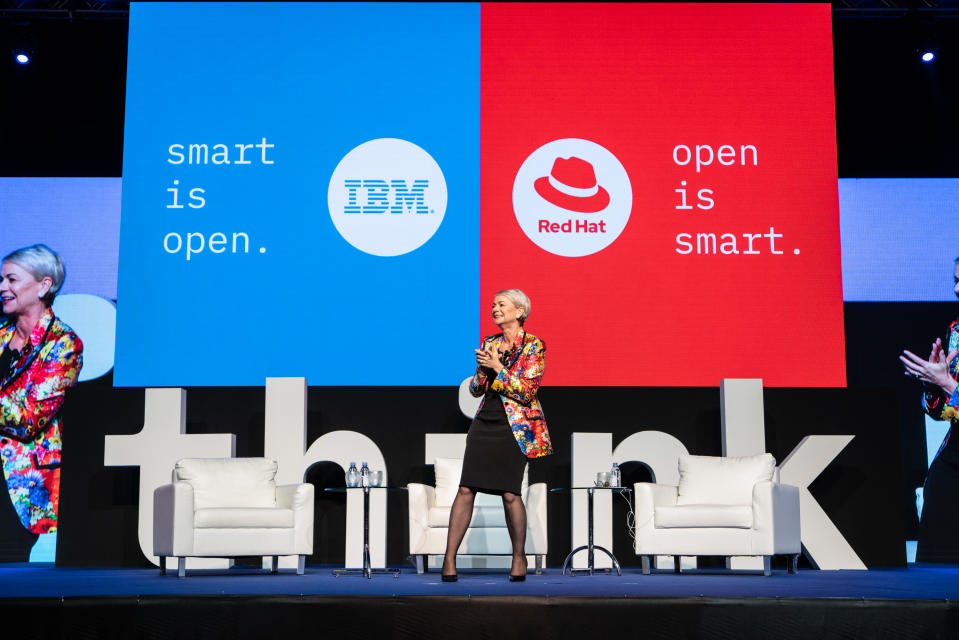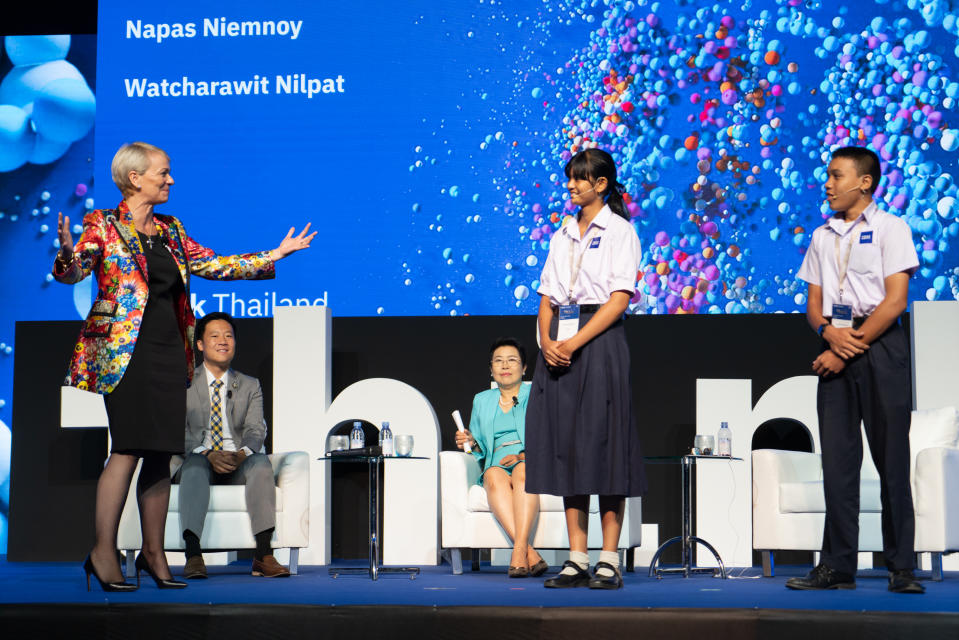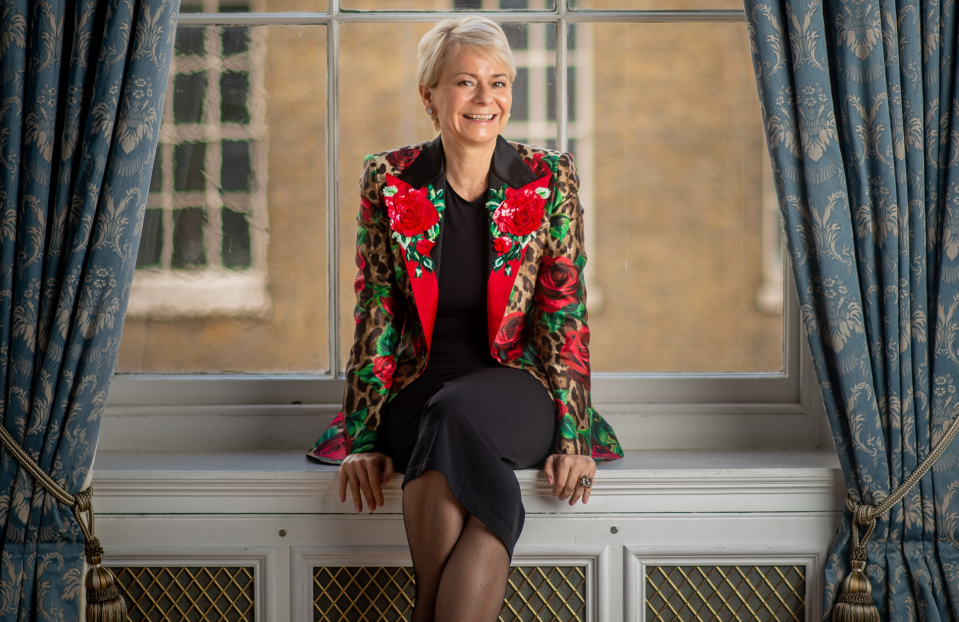How this IBM boss is encouraging staff to bring '150% of themselves' to work

IBM Asia Pacific chief executive Harriet Green was awarded fifth place in this year’s HERoes Top 100 Women Role Model Executives list. The list, released by diversity and inclusion network INvolve and supported by Yahoo Finance, celebrates women who are leading by example and driving change to increase gender diversity in the workplace. View the full HERoes Top 100 Women Executives list here.
One of Harriet Green’s favourite maxims is the quote attributed to the poet and author Maya Angelou: “People will forget what you said, people will forget what you did, but people will never forget how you made them feel.”
The Angelou saying appears to chime with Green’s preferred leadership style. “I felt that my whole life, putting yourself in someone else’s shoes, this I think is at the core of great inclusion and great leadership,” Green told Yahoo Finance UK.
‘I’m moved when I find others who don’t have a voice’
Previously CEO of travel company Thomas Cook (TCG.L), Green joined IBM in 2015 and relocated to lead its Asia-Pacific region last year. Prior to that, she was CEO of electronic components distributor Premier Farnell (PFL.L) and held various international roles at Arrow Electronics (ARW).
Green grew up in Shipton Oliffe, a rural English village she describes as so tiny it had “no pubs and three churches.” She didn’t necessarily seek out her high-flying portfolio career from an early age, but, looking back, she can see how her childhood was formative.
Green had a strong desire early on to leave her sleepy village behind. It was a place where “people own[ed] lots and lots of land and we didn’t ... I was unlikely to marry a young farmer,” she said.

In the early ‘80s, at the age of 18, Green upped sticks to study medieval history and the Queen Mary University of London and has lived in cities ever since.
Looking back at her poems and writings from her university days, Green said can see themes of “emancipation” — from watching a lecture from British politician Tony Benn to witnessing the burgeoning Pride movement — and that she had the desire early on to be a driver of change.
“Very early on for me, you’re looking around for role models in society ... it began to strike me that in the absence of many [women] role models in arts, business, culture ... maybe it was a role of mine to create and coach and develop and support others — because as you looked around, who else was going to do it?” Green said.
Tragically, Green’s father died from a brain tumour when she was just 14. As the eldest sibling, often standing up for her mother, “I had a need, because of the circumstances we were in, to exercise my voice,” said Green. “I’m often conscious when I speak or when I champion others who don’t have a voice, it comes from that sort of place.”
“I’m moved when I find others who don’t have a voice or haven’t had those opportunities. Or even perhaps,” Green laughs, “just aren’t as extroverted, aggressive and pushy as I am.”
Encouraging people to bring ‘150% of themselves’ to work
Green’s first big job out of university was as a management trainee at Macro Group, one of the largest semiconductor companies in the UK. She became managing director within a decade and began to see how she could use her senior position to help others — not always playing by other people’s rules, she says.
Now at IBM, Green has placed a strong focus on fostering diversity and inclusion (D&I).
In this year’s HERoes ranking, Green is credited for being a key executive sponsor of the company Women@IBM community, which has a membership of more than 90,000. Some 40% of Green’s executive leadership team over the 15 countries she presides are women. She also supports company D&I initiatives that range from age inclusion to LGBT+.
“If people can bring 150% of themselves to work because they feel psychologically safe — whether they are a single mum of two kids, a middle-aged man who’s looking after his ageing parents, someone who’s in transition —I have always felt that our role as leaders, as mentors, as coaches is to create environments when people can be really who they are,” she said.
“The power of everyone being able to bring 150% of themselves to work because they are not covering, they are not ashamed, they are not feeling, ‘I don’t really belong here,’ is so, so powerful,” Green added.

IBM, Green says, has been leading the charge on D&I for some time. In 1899, the company hired its first women and black employees. The company hired its first disabled employee in 1914.
“We see diversity and inclusion not just as a matter of reality but as a business strategy for technology,” Green said. AI, blockchain and cybersecurity are all areas of IBM’s operations in which the company is looking to mitigate any opportunities for harmful bias, for example
Another of Green’s passion projects is the work the company is doing to educate young people in the STEM (science, technology, engineering and mathematics) fields. That includes its Pathways in Technology Early College High School (P-TECH) programme, which has launched in five countries across Asia, and its initiative to train more than 1 million women in STEM in India.
D&I extends beyond the staff a company employs to the products it offers and the impact it has on society.
Green helps to oversee IBM’s work on LGBT+ inclusion in the APAC region. In India last year, ahead of the Supreme Court ruling that decriminalised homosexuality in the country, IBM organised a conference with the non-profit OUT&Equal. In June, IBM became the founding principal partner of the Victorian Pride Centre in Melbourne, Australia.
‘Be the change you want to see in the world’

Green encourages all organisations to make D&I integral to their business strategies. Her advice is to think of a D&I plan like the human body:
“It starts with the psychology: How do you think? How do you feel? What is your culture? What are your beliefs?
“Then your physiology — the nerve endings, the blood flows: How do we change those? How do we create a metric, a cadence of doing the right thing?
“And then ultimately, what is the anatomy? How are we structured?”
No matter a person’s level within their organisation, Green encourages everyone to “be the change [they] want to see in the world.”
“All of us have a role in developing and coaching and changing — it’s not [just] bigwigs in any shape or form,” Green said.
“Anyone can do this — you don’t require a degree in business psychology.”
READ MORE:
Yahoo Finance is supporting diversity and inclusion network INvolve’s executive role model lists across EMpower, HERoes, and OUTstanding. Nominations for the 2019 OUTstanding role models lists are open.

 Yahoo Finance
Yahoo Finance 